BRUNSWICK — Bowdoin College’s oldest active student organization is a testament to free speech and debate. Lately, though, the group’s reputation has become strained.
For more than 200 years, the Peucinian Society has offered a forum for good faith, well-informed debate on everything from politics and philosophy to art and literature.
But members say the heightened political tensions outside the group are increasingly seeping its way in. Discussions are more heated. Some members have left over the questions being debated.
“A lot of people don’t find disagreement as worthwhile,” Bowdoin sophomore and Peucinian member Navya Arora told the Press Herald in October. The group was named after the Greek word for pine-covered, a nod to the school’s idyllic Midcoast setting.
While college campuses have long been viewed as places where young adults can speak freely, the last year has left many wondering if that’s still true.
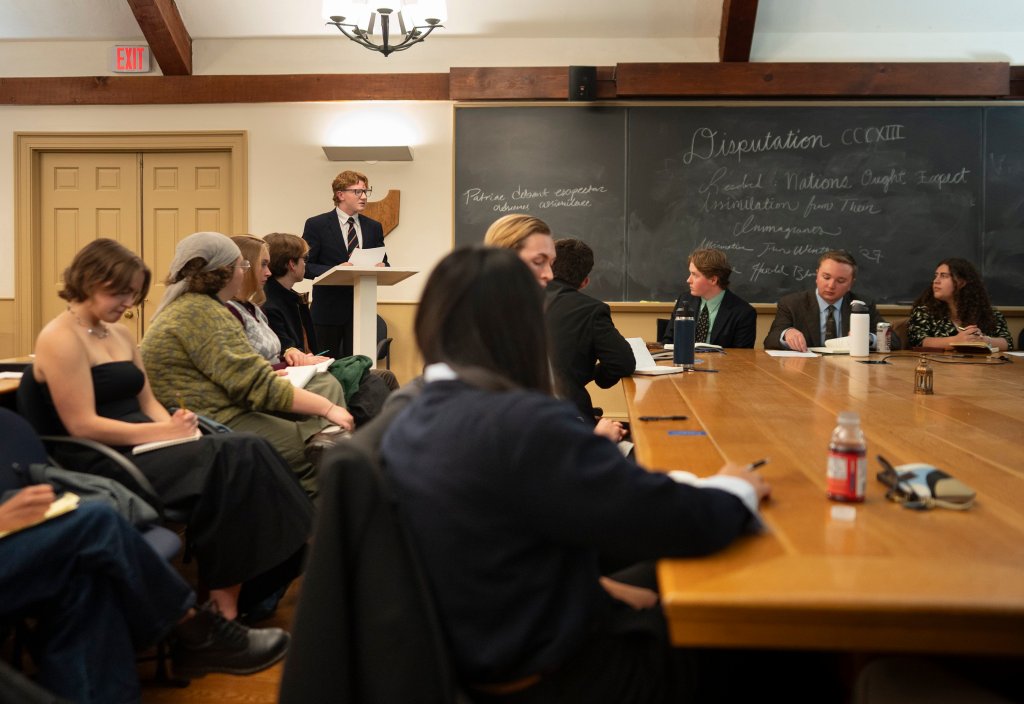
Internal conflicts, outside scrutiny and federal pressures on immigration and higher education have tempered how professors, students, college journalists and especially international students debate and express their views and debate others.
“From what I’ve observed, there is a chill on college campuses across the country,” said Jeffrey Selinger, who researches and teaches American politics at Bowdoin. “A wide range of people are more nervous about what they say publicly, online, and certainly in the student newspaper.”
More than a dozen students at colleges across Maine told the Portland Press Herald that living in such a polarized time has fostered a reluctance around political speech. Many of them were unwilling to talk on the record or provide their names, and some even retracted their comments, citing concerns about backlash.
That tension has played out at Bowdoin in the last year as the school has seen a dayslong pro-Palestine student encampment, criticism over its decision to reprimand the organizers, a subsequent congressional investigation into the ordeal and a spate of violent threats tied to a vigil for conservative podcaster Charlie Kirk, who was killed in September.
While each event made the campus more tumultuous, Bowdoin says it responded to them appropriately and according to school policy. Doug Cook, a spokesperson for Bowdoin, said active, respectful disagreement on campus has become “a top priority over the past several academic years.”
“Bowdoin believes more deeply than ever in our endeavor to prepare students to engage across differences, armed with context, history, integrity, and empathy. Freedom of expression is essential to this mission,” Cook wrote in an email. “When issues of safety intersect with free expression, our goal is to protect both.”
Other Maine colleges, especially the public University of Maine System, have been targeted with federal grant revocations, investigations and litigation after a public spat between Gov. Janet Mills and President Donald Trump in February over transgender girls competing in sports.
What’s happening in Maine is not unique. Trump has threatened many elite universities with lawsuits, investigations and funding clawbacks over similar pro-Palestine encampments and transgender sports policies. Some colleges have fought and won in court. Others have made settlements to avoid litigation.
Many campus progressives worry the Trump administration is weaponizing colleges to quash dissent — something conservatives have claimed the left has done for decades.
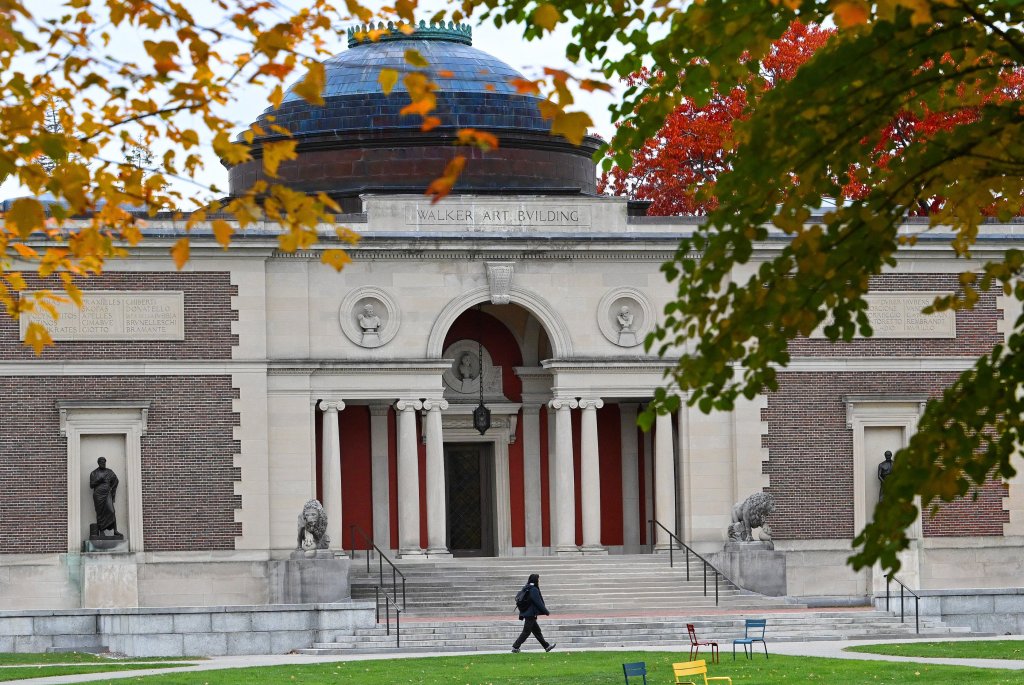
INTERNATIONAL STUDENTS ON EDGE
International students have become particularly vulnerable amid the Trump administration’s crackdown on immigration and higher education.
In recent months, the government has canceled, delayed and revoked student visas en masse, detained and attempted to deport international students over their political activism, and begun monitoring international students’ social media accounts for “hostile attitudes,” among other actions.
The actions have fostered a reluctance among international students to exercise their First Amendment rights. Most of the international Bowdoin students who spoke to the Press Herald said they have censored themselves to some extent in the last year out of fear of retribution. All of them asked not to be identified by name because of the same concern.
“It feels like you’re under constant surveillance,” one said.
“Just look at Rümeysa,” said another, referring to Tufts University student Rümeysa Öztürk, who was detained after having her visa revoked over her pro-Palestinian activism, specifically an op-ed she had co-authored for the college’s student paper.
Editors at the Bowdoin Orient, the school’s student newspaper, said fewer international students are writing in, likely out of fear of being targeted.
“I do think international students are put in the hardest position right now, in terms of not speaking out,” said sophomore Leah Kiros, the paper’s opinion editor.
The Orient went so far as to change its policy around opinion pieces last spring, allowing international students to remove stories they published in the past if they can prove they may experience legal repercussions for it remaining online.
“The detainment of Öztürk demonstrates the current executive administration’s willingness to persecute non-U.S. citizens for exercising their First Amendment rights,” editors wrote.
Editors have had few requests and even fewer pieces they actually pull; they assess situations on a case-by-case basis. Kiros said so far this semester, she hasn’t had to take down any. And no international students have submitted new opinion pieces.
“I’ve just tried to respect that they’re scared right now,” she said.
Obie Casperson, a junior and the editor-in-chief of the Maine Campus, the student newspaper at the University of Maine, has witnessed that same fear. The public university in Orono has the state’s largest international student population — there are about 970 across the whole University of Maine System, more than half of them at UMaine — but Casperson said when she attempted to write a story about immigration enforcement, she couldn’t get a single international student to speak with her.
“It’s completely understandable,” Casperson said, mentioning that students cited fears about their safety and legal status. “There’s no reward for them.”
The Press Herald faced similar challenges in persuading international students to talk.
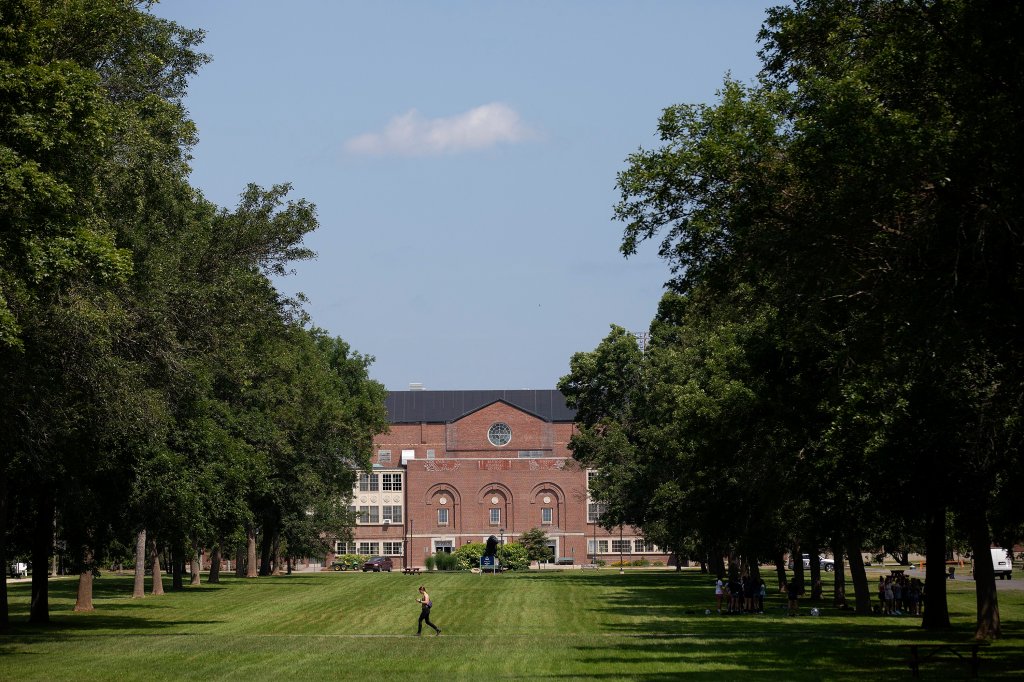
A progressive political group on campus, Students for a Democratic Society, told her their numbers have been growing, but their international student participation has been shrinking.
“They’re not seeing international students come to meetings or go to protests, while in the past they feel like that hasn’t been the case,” Casperson said.
CHALLENGES AT STUDENT PAPERS
At the University of Maine, student editors said covering political issues, rallies and tensions on campus has been complex.
They said attempts to cover a college Republicans event shortly after Kirk’s assassination were stymied when members of the local chapter of Turning Point USA said they were instructed not to talk to any media.
Similarly, efforts to cover Jewish Voice for Peace rallies and events on campus last spring suffered when members of that group — which advocates for Palestine and has called for the university system to divest from companies that sell weapons to Israel — objected to allowing student journalists to photograph them. Casperson said she thinks that was a direct reaction to the detention of Mahmoud Khalil, a Columbia University graduate student and U.S. permanent resident who the Trump administration is attempting to deport for his role in pro-Palestine protests.
Maine Campus photo editor Tyler Bridges said at various political protests and rallies he has covered, students are afraid of the lens.
“I noticed a lot of people turn away if they saw my camera pointing toward them,” said Bridges, a sophomore. “You can definitely see a lot more fear than you could previously.”
But Casperson and Bridges both said they’ve been able to overcome that reticence this semester with a combination of time and personal conversations with organizations and sources that can help decrease the tension.
Kiros, the opinion editor from The Bowdoin Orient, said there was increased interest in publishing op-eds during the last school year, as the 2024 election and early days of Trump’s presidency dominated headlines, but that has cooled in recent months.
“There was a shift, I would say this summer and at the beginning of this semester — a downward shift — in how willing people are to submit or openly talk about politics in general,” she said. “People have been scared to get their words out.”
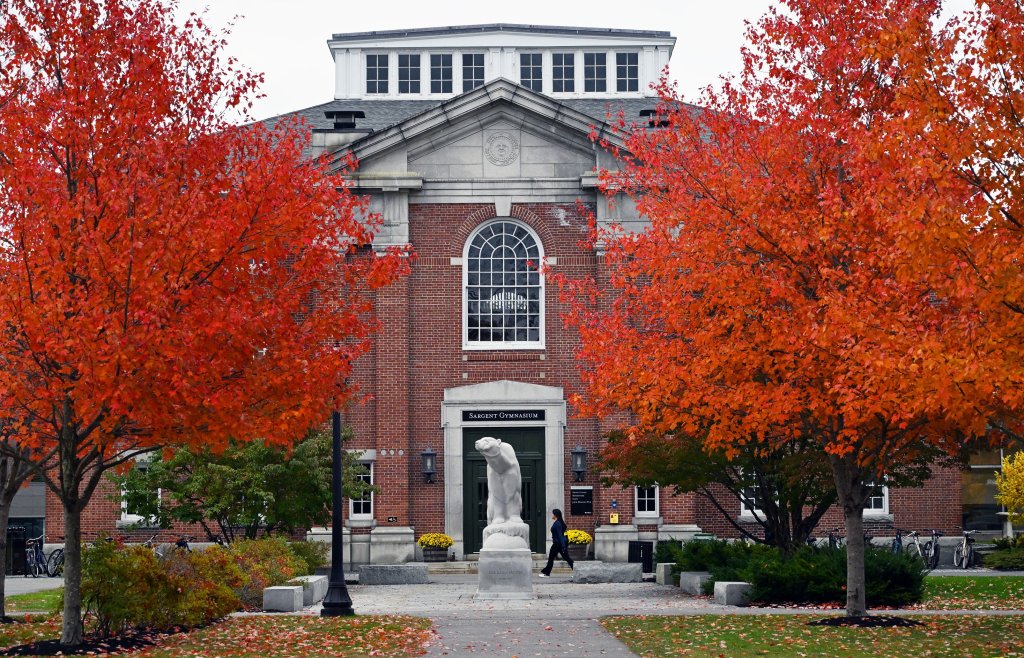
To encourage submissions, Kiros said she reaches out to student groups she knows might have something to say, or individual students she hears might be vocal on those topics. She said members of groups like the Peucinian Society can serve as a source on opposing perspectives.
“As long as they’re not hateful, I don’t want any voices on campus to be silenced. Because we’re at a small college, we can all learn from each other,” Kiros said. “As long as it’s not a harmful thing to say, I don’t think there’s any harm in hearing it.”
ON CAMPUS CLIMATE
Some students feel political speech is being stifled by the school administration. Others say their classmates are the ones muzzling debate.
In February, Bowdoin placed eight students on probation and revoked the charter of Students for Justice in Palestine, who organized the encampment at Smith Union, which the college says violated school policy requiring protests not to disrupt daily operations. Some students saw the move as a signal that the school is singling out certain points of view.
“I think Bowdoin was able to pretty effectively silence any criticism of the administration and criticism of Israel that they view as unfavorable,” said Finley Rhys, a sophomore at Bowdoin.
Many alumni and current students heavily criticized what they saw as the college’s tepid acknowledgment of class of 2014 member Zohran Mamdani’s historic win in the New York City mayoral race; Mamdani was the founder of Students for Justice in Palestine during his time at the school.
Others say pro-Palestinian activism is not under attack at Bowdoin, pointing to a number of panel discussions and movie screenings that have been held on-campus since the encampment ended.

Zak Asplin, president of the Bowdoin College Republicans, doesn’t believe there’s a specific attack on free speech at Bowdoin. Instead, he says free speech “just doesn’t exist.” Bowdoin’s student body leans largely to the left — which is supported by the results of a student body survey conducted by the Orient — and Asplin said that has fostered a culture that is unable to stomach disagreement.
“So many Bowdoin students don’t have to live with, work with, or understand viewpoints they disagree with, and so they just don’t know how to do that,” he said. “There is a sort of social taboo around disagreeing on campus with the progressive norm.”
That sentiment was present in September, when Bowdoin postponed a vigil in remembrance of Charlie Kirk over an “external threat” received by the school.
Though organizers said the vigil was not political, they felt its postponement sent Bowdoin conservatives the same message that Students for Justice in Palestine members felt after their charter was revoked: Free speech looks different now, and you’re on notice.
In the wake of Kirk’s death, other Maine colleges have dealt with the growing interest in his group Turning Point USA, as well as pushback against the organization. At Southern Maine Community College, many students called on the student senate and school not to green light a chapter, which they worried would spread hate on campus. But a college official reminded students that approval of clubs is “a viewpoint-neutral process” and said recognizing the group, which it did in October, was not an endorsement of its ideology.
‘WE’RE CIVIL FIRST’
Bowdoin, for its part, is trying to turn down the temperature on campus. In recent years, the college has tried to foster active debate on campus by hosting a series of guest lectures and on campus events designed to teach students how to engage with people and opinions they disagree with.
“Bowdoin is educating students to be at home in an increasingly polarized world in which political divides feel more pronounced and in which transformative technology is rapidly changing the way we communicate and work,” Cook, the college spokesperson, wrote in an email.
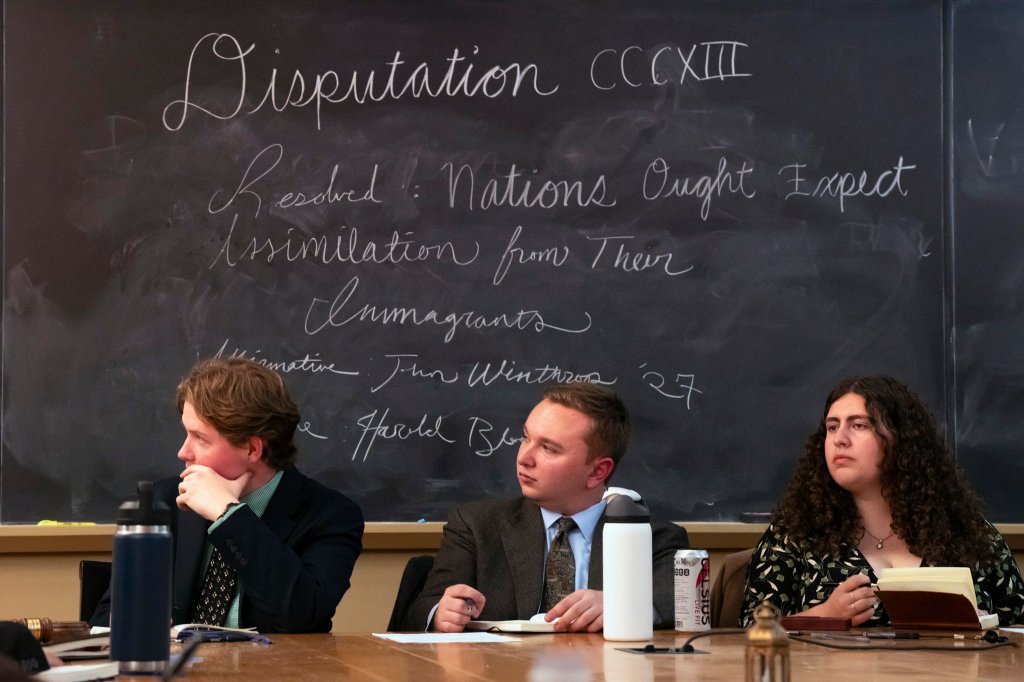
Some, like Asplin, say the Peucinian Society’s structured weekly meetings are one of the only places they feel comfortable enough to have an honest debate.
The meetings are held late at night in the oldest building on campus. Members must wear formal attire and refer to one another with historical pseudonyms to help squash personal squabbles.
Meetings are designed to foster conversation. They begin with the reading of a poem and arguments in the affirmative and negative. Midway through the debate, members take a walk around the quad with someone they haven’t spoken to before and discuss the topic at hand. At the end, sometimes as late as 11:30 p.m., members vote in favor or opposition to the issue being debated.
The society has never shied away from fraught conversations. At the group’s Oct. 16 meeting, for example, they debated whether nations should expect their immigrants to assimilate. Many in the group see the structured debate as a way to break barriers and divides between members. Others view the particularly controversial discussions as a means for some students to share harmful views and instigate fights. One student left the group shortly before the Oct. 16 meeting for that reason.
Still, most of the Peucinian’s members, including President Mark Mateo, see the group as a stalwart of open debate. Asking difficult and sometimes provocative questions is the only way to work through the issues at hand, he said.
“We’re not trying to discuss hot button issues for the sake of discussing them,” he said. “I think if decorum is the end of discussion and we discussed for the sake of being civil, that’s the wrong way. But we’re civil first and that’s the building block upon which Peucinian is able to operate.”
Correction: A previous version misstated the number of international students at the University of Maine, the error has been corrected.
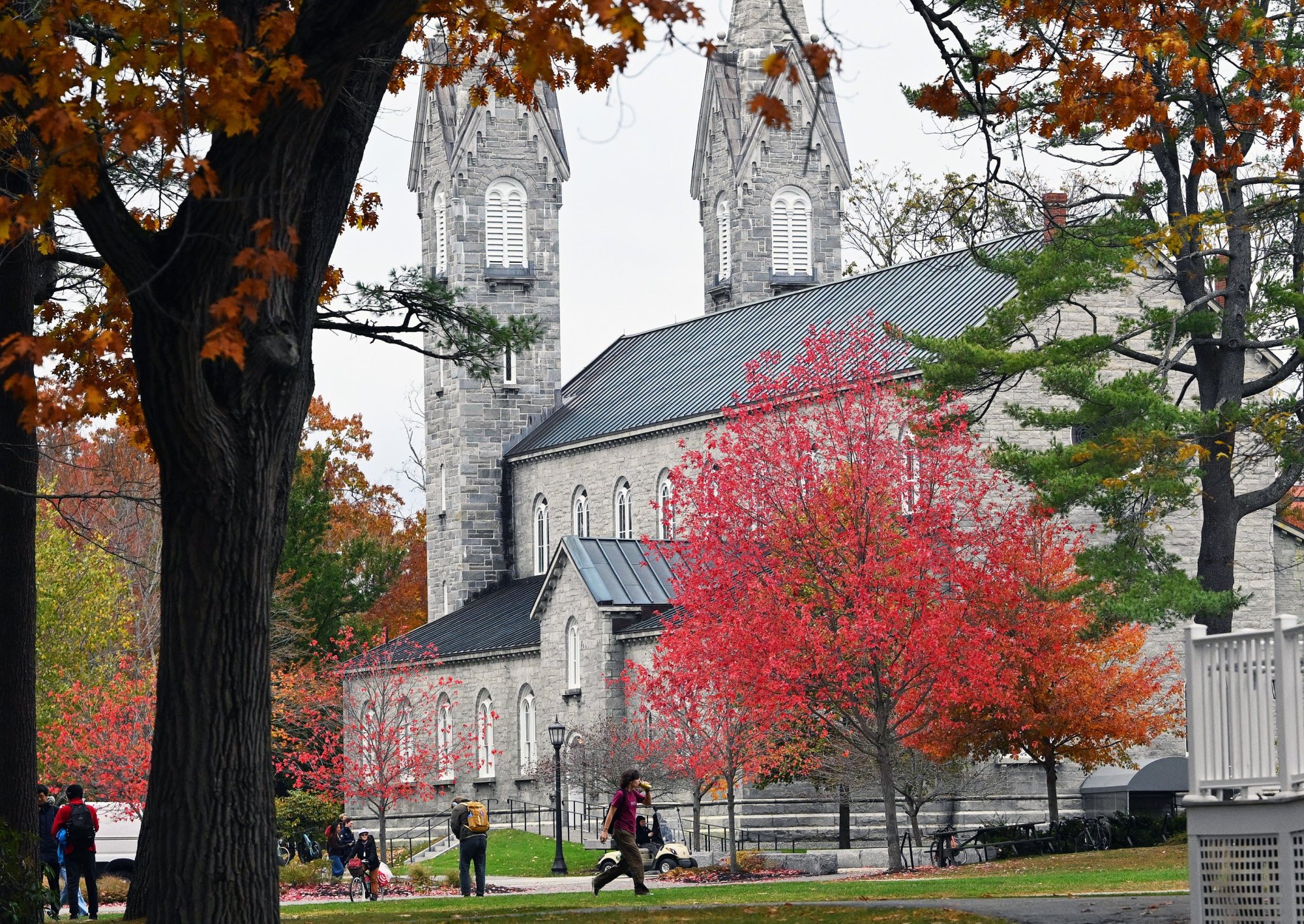


We invite you to add your comments. We encourage a thoughtful exchange of ideas and information on this website. By joining the conversation, you are agreeing to our commenting policy and terms of use. More information is found on our FAQs. You can modify your screen name here.
Comments are managed by our staff during regular business hours Monday through Friday as well as limited hours on Saturday and Sunday. Comments held for moderation outside of those hours may take longer to approve.
Join the Conversation
Please sign into your CentralMaine.com account to participate in conversations below. If you do not have an account, you can register or subscribe. Questions? Please see our FAQs.